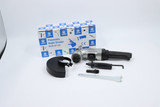Best Practices for Maintaining Air Tools in Maryland’s Humid Climate
Key Takeaway
- Regular Lubrication: Frequent lubrication for air tools is essential to prevent moisture buildup and reduce friction, especially in Maryland's humid climate, which can accelerate rust and corrosion.
- Proper Storage: Store air tools in a dry, well-ventilated area with dehumidifiers or silica gel packs to minimize exposure to moisture and humidity, which can cause rust over time.
- Rust Prevention: Use rust inhibitors or protective coatings on metal surfaces to shield tools from humidity, ensuring longer tool lifespan and reliable performance in damp conditions.
Introduction
Maryland's humid climate presents unique challenges for professionals using air tools. The high moisture levels in the air can lead to rust, corrosion, and reduced tool efficiency, making proper maintenance crucial. Whether you're a mechanic, carpenter, or construction worker, keeping your air tools in optimal condition requires understanding the impact of humidity and implementing best practices to mitigate its effects.
Best Practices for Maintaining Air Tools against Humidity
Humidity can wreak havoc on air tools, leading to rust, corrosion, and internal damage. When air tools are exposed to humid conditions, moisture can accumulate inside the tool, affecting its moving parts and leading to decreased efficiency. Over time, this can result in tool failure and costly repairs.
To combat these issues, it's essential to understand how humidity affects your tools and take proactive steps to protect them.
1. Regular Lubrication
One of the most effective ways to protect your air tools from humidity is through regular lubrication. Applying lubricant to the moving parts of your tools helps to create a barrier against moisture, reducing the risk of rust and corrosion. Make sure to use high-quality lubricants specifically designed for air tools, and follow the manufacturer's recommendations for frequency and application.
2. Use of Air Dryers and Filters
Investing in an air dryer or filter can significantly reduce the amount of moisture entering your air tools. Air dryers remove moisture from the air before it reaches your tools, while filters trap any remaining particles. These devices are especially important in humid climates like Maryland, where moisture levels are consistently high.
Internal Link: Best Hand Tools
3. Proper Storage
Storing your air tools correctly is essential to prevent moisture damage. Keep your tools in a dry, cool environment, and avoid leaving them in damp or humid areas. Using a storage case with moisture-absorbing packets can also help keep your tools dry when not in use.
Internal Link: Best Hand Tool Brands
4. Regular Inspections
Conduct regular inspections of your air tools to check for signs of rust, corrosion, or moisture damage. If you notice any issues, address them immediately to prevent further damage. Regular inspections also allow you to catch potential problems early, saving you time and money in the long run.
5. Professional Maintenance Services
For professionals using air tools regularly, investing in professional maintenance services can be a wise decision. Professional services can provide thorough cleaning, lubrication, and inspections, ensuring your tools remain in top condition despite Maryland's humid climate.
Frequently Asked Questions
1. How often should I lubricate my air tools in a humid climate?
Lubrication frequency depends on the tool and its usage. However, in humid climates like Maryland, it's recommended to lubricate your air tools before and after each use to prevent moisture-related damage.
2. Can I use regular oil for lubricating air tools?
It's best to use oil specifically designed for air tools. Regular oil may not provide the necessary protection against moisture and could potentially damage your tools.
3. What is the best way to store air tools in a humid environment?
Store your air tools in a dry, cool place, preferably in a storage case with moisture-absorbing packets. Avoid leaving tools in damp areas, as this increases the risk of rust and corrosion.
4. How do air dryers and filters help protect air tools?
Air dryers remove moisture from the air before it reaches your tools, while filters trap remaining particles. These devices are crucial in humid environments to prevent moisture from entering and damaging your air tools.
5. Should I consider professional maintenance for my air tools?
Yes, especially if you use your air tools regularly. Professional maintenance services can provide thorough cleaning and inspections, ensuring your tools remain in optimal condition despite the challenges posed by Maryland's humid climate.
Related Article
Advanced Air Tool Maintenance Tips for Maryland's Seasonal Weather Conditions
Maintenance Tips: Ensuring the Longevity of Your Air Tools
Conclusion
Maintaining air tools in Maryland’s humid climate requires vigilance and proactive care. By following these best practices, you can protect your tools from moisture damage, extend their lifespan, and ensure consistent performance.
Call to Action: For high-quality air tools and maintenance supplies, visit Tend Industrial Supplies or contact us at sales@tendsupplies.com. Equip yourself with the tools and knowledge to keep your equipment in top condition.









